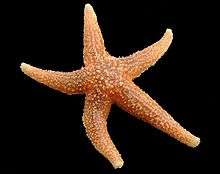Forcipulatida
The Forcipulatida are an order of sea stars, containing three families and 49 genera.
| Forcipulatida | |
|---|---|
 | |
| Asterias rubens | |
| Scientific classification | |
| Kingdom: | |
| Phylum: | |
| Class: | |
| Superorder: | Forcipulatacea |
| Order: | Forcipulatida |
| Families | |
|
See Text | |
Description
Forcipulatids share with the brisingid sea stars distinctive pedicellariae, consisting of a short stalk with three skeletal ossicles. Unlike that group, however, the forcipulatids tend to have more robust bodies.[1] The order includes some well-known species, such as the common starfish, Asterias rubens.
Phylogeny
The order is divided into three families:[2]
- Family Asteriidae — 39 genera
- Family Heliasteridae — two genera
- Family Zoroasteridae — eight genera
World Register of Marine Species gives another taxonomy, with 7 families and 64 genera:
- Family Asteriidae Gray, 1840
- Family Heliasteridae Viguier, 1878
- Family Pedicellasteridae Perrier, 1884
- Family Pycnopodiidae Fisher, 1928
- Family Stichasteridae
- Family Zoroasteridae Sladen, 1889
A 2020 study involving phylogenetic analysis and scanning electron microscopy of the skeleton and ossicles of taxa from the superorder Forcipulatacea recovered Asteriidae, Stichasteridae, Zoroasteridae, and Brisingida as monophyletic.[3]
See also
References
- Barnes, Robert D. (1982). Invertebrate Zoology. Philadelphia, PA: Holt-Saunders International. p. 948. ISBN 0-03-056747-5.
- McKnight, D.G. (2006). Marine Fauna of New Zealand: Echinodermata: Asteroidea (sea-stars). 3. Orders Velatida, Spinulosida, Forcipulatida, Brisingida with addenda to Paxillosida, Valvatida. NIWA Biodiversity Memoir 120: 1-187.
- Fau, Marine; Villier, Loïc (2020). "Comparative anatomy and phylogeny of the Forcipulatacea (Echinodermata: Asteroidea): insights from ossicle morphology". Zoological Journal of the Linnean Society. 189 (3): 921–952. doi:10.1093/zoolinnean/zlz127.
Further reading
- Mah, C. & D. Foltz. (2011). Molecular Phylogeny of the Forcipulatacea (Asteroidea: Echinodermata): systematics and biogeography. Zoological Journal of the Linnean Society 162(3): 646-660
- Sladen, W.P. (1889). Report on the Asteroidea. Report on the Scientific Results of the Voyage of H.M.S. Challenger during the years 1873-1876, Zoology 30(51): xlii + 893 pages 118 plates.
| Wikimedia Commons has media related to Forcipulatida. |